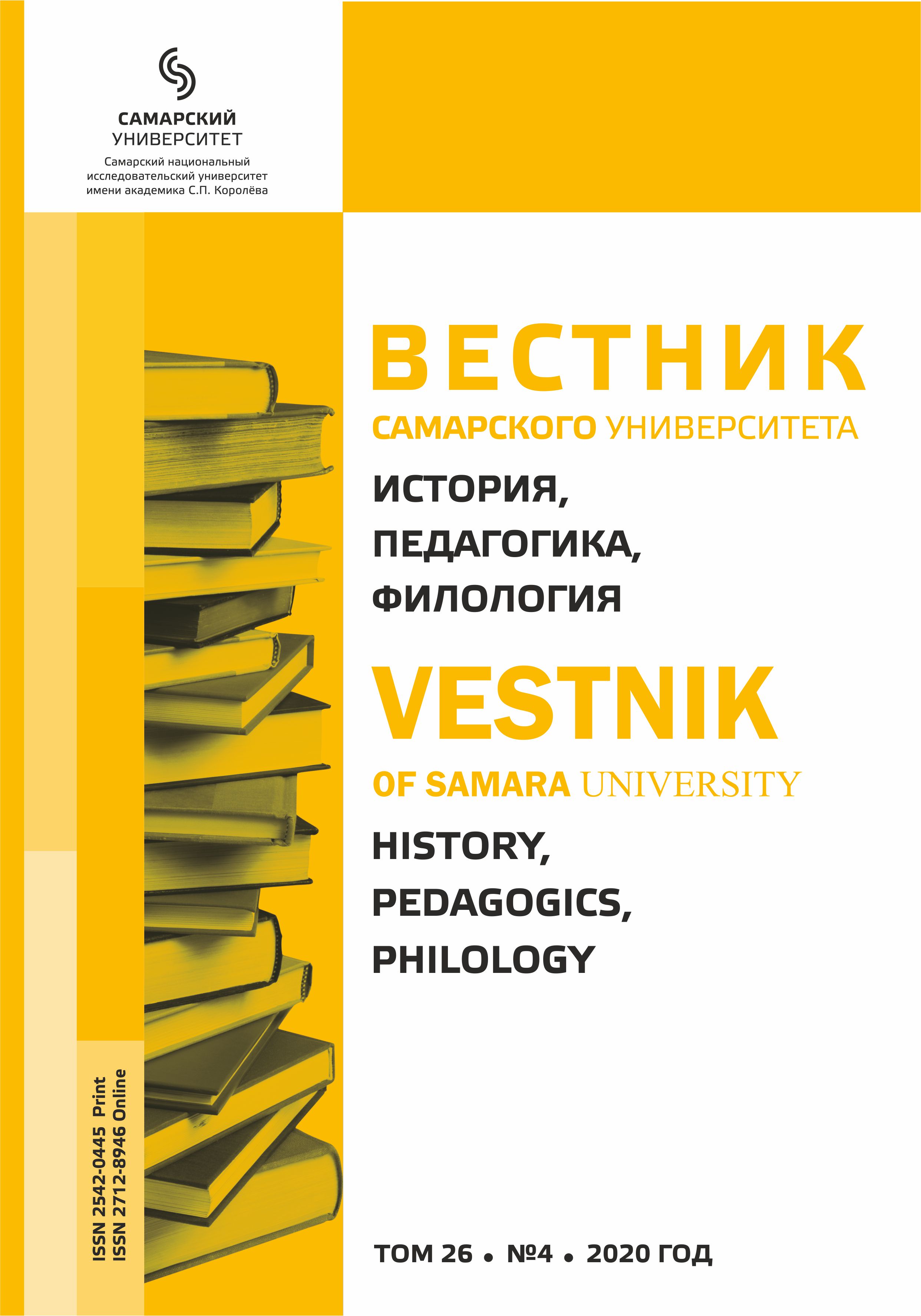Готовность преподавателя к взаимодействию с одаренными обучающимися
- Авторы: Соловова Н.В.1, Ежов Д.А.1,2, Яшкин С.Н.3,2
-
Учреждения:
- Самарский национальный исследовательский университет имени академика С.П. Королева
- Самарский региональный центр для одаренных детей
- Самарский государственный технический университет
- Выпуск: Том 26, № 4 (2020)
- Страницы: 57-63
- Раздел: Статьи
- URL: https://journals.ssau.ru/hpp/article/view/8253
- DOI: https://doi.org/10.18287/2542-0445-2020-26-4-57-63
- ID: 8253
Цитировать
Полный текст
Аннотация
В статье авторами рассматривается проблема готовности преподавателя к взаимодействию с одаренными обучающимися в процессе их непрерывного развития. В современном российском обществе возрастает потребность в людях неординарно мыслящих, творческих, активных, способных нестандартно решать поставленные задачи и формулировать новые перспективные цели. В этих условиях поддержка и развитие одаренных обучающихся становятся одной из приоритетных задач системы образования. Актуальность статьи обусловлена тем, что переход общего и профессионального образования к новой образовательной парадигме, вызванный преобразованиями российского общества, сопровождается усилением внимания к одаренным обучающимся и, как следствие, подготовкой преподавателя всех уровней системы образования к взаимодействию с обучающимися, интеллектуальный и творческий потенциал которых рассматривается в качестве основного капитала государства. В статье авторы представляют результаты контент-анализа научных работ в области развития одаренных обучающихся, а также нормативных и правовых актов Российской Федерации в сфере образования. Вводят понятие «педагогический менеджмент» (комплекс подходов, принципов, методов, организационных форм и технологических и методических приемов обучения, направленных на повышение качества и результативности непрерывного развития одаренных обучающихся, который состоит из этапов: выявления, диагностики, обучения, развития, сопровождения и поддержки). В результате исследования авторы, основываясь на принципе идентификации видов деятельности преподавателя на основных эпапах педагогического менеджмента, предложили компонентную структуру готовности преподавателя к взаимодействию с одаренными обучающимися, интегрирующую мотивационно-ценностный, когнитивно-методический, нормативно-организационный, рефлексивно-оценочный и коммуникативно-тьюторский компоненты
Об авторах
Н. В. Соловова
Самарский национальный исследовательский университет имени академика С.П. Королева
Автор, ответственный за переписку.
Email: solovova.nata@mail.ru
ORCID iD: 0000-0002-3280-3380
доктор педагогических наук, доцент, заведующий кафедрой управления человеческими ресурсами, профессор кафедры теории и методики профессионального образования
Россия, 443086, Российская Федерация, г. Самара, Московское шоссе, 34Д. А. Ежов
Самарский национальный исследовательский университет имени академика С.П. Королева;Самарский региональный центр для одаренных детей
Email: dan_ezhov@mail.ru
ORCID iD: 0000-0003-4209-7608
аспирант, кафедра теории и методики профессионального образования;
заместитель директора
Россия, 443086, Российская Федерация, г. Самара, Московское шоссе, 34; 443016, Российская Федерация, г. Самара, ул. Черемшанская, 70С. Н. Яшкин
Самарский государственный технический университет;Самарский региональный центр для одаренных детей
Email: snyashkin@mail.ru
ORCID iD: 0000-0002-2549-5607
доктор химических наук, доцент кафедры аналитической и физической химии;
учитель химии
Россия, 443100, Российская Федерация, г. Самара, Молодогвардейская, 244; 443016, Российская Федерация, г. Самара, ул. Черемшанская, 70Список литературы
- Ансимова, Золотарева, Лекомцева 2017 – Ансимова Н.П., Золотарева А.В., Лекомцева Е.Н. Методологические и методические основы оценки результативности работы педагогов с одаренными детьми // Ярославский педагогический вестник. 2017. № 5. С. 33–40. URL: https://cyberleninka.ru/article/n/metodologicheskie-i-metodicheskie-osnovy-otsenki-rezultativnosti-raboty-pedagogov-s-odarennymi-detmi; https://www.elibrary.ru/item.asp?id=30549512.
- Власова 2010 – Власова И.В. Возможности предметной лаборатории для развития одаренных детей // Научное обеспечение системы повышения квалификации кадров. 2010. № 2 (4). С. 99–103. URL: https://cyberleninka.ru/article/n/vozmozhnosti-predmetnoy-laboratorii-dlya-razvitiya-odarennyh-detey; https://www.elibrary.ru/item.asp?id=24160974.
- Ежов, Полежаев 2019 – Ежов Д.А., Полежаев Р.Г. Региональная система сопровождения одаренных детей: опыт, задачи, перспективы. Функционирование «Веги» // Современное образование: актуальные вопросы и инновации. 2019. № 4. С. 227–236. URL: https://www.elibrary.ru/item.asp?id=42477540.
- Ежов, Соловова, Яшкина 2019 – Ежов Д.А., Соловова Н.В., Яшкина Е.А. Интегративно-комплексный подход «трех-Т» к педагогическому менеджменту развития одаренных обучающихся // Тенденции развития науки и образования. 2019. № 52. Ч. 1. С. 21–24. DOI: http://doi.org/10.18411/lj-07-2019-06.
- Ежов, Яшкина 2019 – Ежов Д.А., Яшкина Е.А. Теоретические аспекты основных направлений взаимодействия педагогов с одаренными обучающимися // Архивариус. 2019. № 8 (41). С. 22–26.
- Зайцева 2011 – Зайцева Н.В. Современные требования к педагогу в работе с одаренными детьми // Среднее образование в России. Т. 2. Москва: Центр стратегического партнерства, 2011. С. 244–248. URL: http://federalbook.ru/files/FSO-SREDNEE/Soderzhanie/SO-2/V/Zajcheva.pdf.
- Психология… 2000 – Психология одаренности: от теории к практике / А.А. Адаскина, М.Р. Битянова, В.Н. Дружинин [и др.]; под ред. Д.В. Ушакова. Москва: ИП, 2000. 128 с. URL: http://creativity.ipras.ru/texts/books/giftedness/giftedness.pdf; https://www.elibrary.ru/item.asp?id=22789282.
- Савенков 2002 – Савенков А.И. Развитие детской одаренности в образовательной среде // Развитие личности. 2002. № 3. С. 113–146.
- Шадрикова 2003 – Шадрикова В.Д. Рабочая концепция одаренности / под ред. В.Д. Шадрикова [и др.]. 2-е изд. Москва, 2003. URL: http://psychlib.ru/mgppu/rko/rko-001-.htm#$p1.
- Яшкин, Ежов 2020 – Яшкин С.Н., Ежов Д.А. Выявление и диагностика одаренных обучающихся // Образование в современном мире: достижения, вызовы, перспективы: сб. науч. тр. / Всероссийская научно-метод. конф. с международным участием; отв. ред. Т.И. Руднева. Самара: Наш Взгляд, 2020. С. 426–430. URL: http://repo.ssau.ru/handle/Obrazovanie-v-sovremennom-mire/Vyyavlenie-i-diagnostika-odarennyh-obuchaushihsya-83612?mode=full.
Дополнительные файлы













